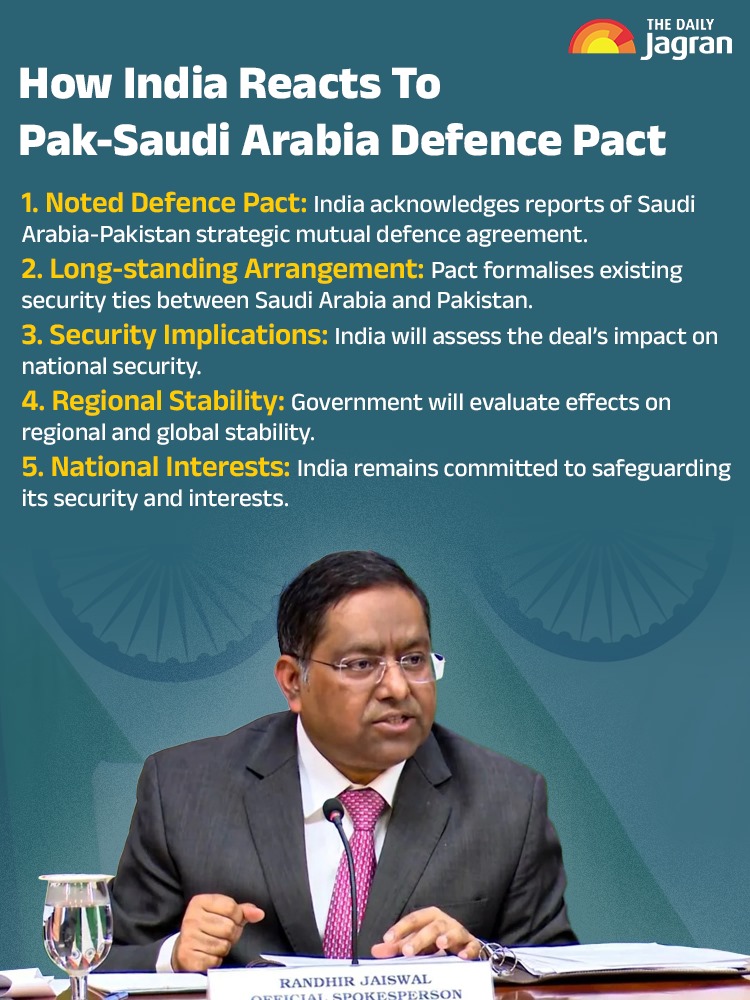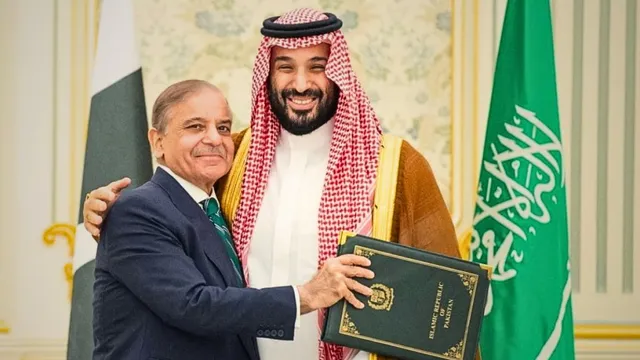- By Supratik Das
- Fri, 19 Sep 2025 10:32 AM (IST)
- Source:JND
Saudi Arabia-Pakistan defence pact: In a dramatic geopolitical step, Saudi Arabia and Pakistan have signed a Strategic Mutual Defence Agreement in which they have promised to regard an attack on either nation as an attack on the other. The agreement, signed in Riyadh by Saudi Crown Prince Mohammed bin Salman and Pakistan Prime Minister Shehbaz Sharif, is being seen as a landmark realignment of regional security architectures.
The deal, supported by Pakistan Army Chief Field Marshal Asim Munir, comes just days after an Israeli airstrike in Doha killed senior Hamas commanders, provoking outrage in Arab capitals. While Riyadh officials assure that the agreement "is not directed against any specific country," its timing serves to underscore growing distrust of US security guarantees in the Gulf.
Key Features Of the Saudi-Pakistan Pact
• Mutual defence pledge: Any assault on the countries will be deemed to be an assault against both.
• All-encompassing coverage: Provides "all military means," without clarifying if Pakistan's nuclear umbrella belongs to the agreement.
• Military approval: The Pakistani army commanders were present during the signing, suggesting institutional endorsement from both countries.
• Strategic timing: The pact was signed just days after Israel's strike in Doha, which exposed the weaknesses of Gulf security.
• Symbolism: For the first time, the custodian of Islam's holiest places has linked its security to the sole Muslim nuclear-armed nation.
Why It Matters?
The deal recasts the strategic calculations of the Gulf, South Asia, and beyond:
• For Israel: The agreement brings in the prospect of a Pakistani nuclear umbrella, making it difficult for Israel to calculate deterrence.
• For US: Washington's credentials as the Gulf's principal security guarantor are in doubt following its subdued reaction to the Doha attack.
• For China: The agreement is a low-key strategic victory, bolstering its allies in both Pakistan and Saudi Arabia.
What It Means For India?
India, which has good relations with Riyadh as well as Tel Aviv, has a tricky situation to deal with. The Ministry of External Affairs (MEA) has said that New Delhi knew that such a deal was being contemplated and will "examine the implications for national security and regional stability."

India's concerns:
• Assertive Pakistan: Support from Riyadh could embolden Islamabad to be more assertive on fronts like Kashmir and cross-border terror.
• Military and economic lift: Saudi financial assistance may enable Pakistan to modernise its armed forces, affecting India's defence indirectly.
• Diplomatic pressure: India is dependent on Saudi Arabia for oil and investments, while Israel is one of its main defence allies. Handling both relationships will become more sensitive.
ALSO READ: Explained: What Is Pakistan-Saudi Arabia Defence Deal And Why Is It Concerning For India? VIDEO
The agreement has rekindled speculation of an "Islamic NATO", a coalition military bloc of Muslim nations. While there are profound differences between states such as Saudi Arabia, Iran, Turkey, and Egypt, increasing insecurity following the Doha attack has renewed calls for collective defence.
Thus, the Saudi-Pakistan defence pact is more than a regional agreement for India; it is a strategic warning signal. It reflects new alignments in the Gulf, increases the risk of more Pakistani assertiveness, and puts New Delhi in a delicate balance act between its allies in Riyadh and Tel Aviv.

